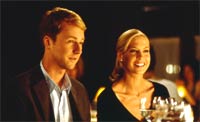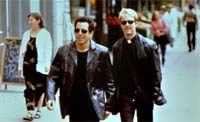
Keeping the Faith
©Buena Vista International. All Rights Reserved.
Photo: Glen Wilson
©Touchstone Pictures & Spyglass Entertainment
Distribution Buena Vista International

|
Hallelujah, brothers and sisters, a comedic apparition hath appeared in the Garden of
The Big Apple showing us all, according to the Gospel of Norton, that we can be united
together in the house of God. After all, what is sermonizing, but another form of
stand-up comedy? This is a West Side Story with a twist.
Brian Kilkenny Finn (Edward Norton) stumbles down Eighth Avenue with a pint of
booze and a heavy heart. Passing the facade of the familiar Blarney Stone, he
stumbles into a quieter bar and winds up pouring out his problems to the friendly New
York bartender Paulie Chopra (Brian George). Mr. Chopra is a Punjabi-Sikh with
Jewish in-laws who sports a button that reads "Kiss me, I'm Irish". Reading
"Dianetics" at the moment, he is more than interested in hearing the story of the
priest and the rabbi. No joke. Brian turns out to be a priest and his best friend, Jake
Schram (Ben Stiller), is a rabbi. Of course, there is also a woman involved. Her
name is Anna Reilly (Jenna Elfman).
Brian, Jake, and Anna used to hang out together as kids in the big city. Then, the
day came when Anna packed up and left town with her family, leaving the guys
alone. Now, several years later, the men are living on the Upper West Side where
each pursues his calling as a man of God. They have a novel approach to religion
and it keeps the congregations coming back for more. They're modern and they're
quick. Their sermons spread the Word with real appeal. When the God Squad gets
on the move, watch out. These dudes leave 'em rolling in the pews and begging for
more.
Keeping the Faith
©Buena Vista International. All Rights Reserved.
Photo: Glen Wilson
©Touchstone Pictures & Spyglass Entertainment
Distribution Buena Vista International

|
Work unexpectedly finds Anna returning to her New York roots. She calls Brian and
arranges for the three of them to get together. The two
confident and successful clerics reunite with the equally successful
businesswoman and they have some wonderful times. The men quickly discover that she's a hard-hitting
corporate executive who is proud that, "I work harder than God. If he had hired me,
he would've made the world by Thursday." Even more unexpectedly, they find that
their relationships begin to take sudden turns as intimate (and forbidden) feelings
begin developing between them.
Jake's mother's Jewish woman friends (the "Kosher Nostra") all seem to have
available daughters and, naturally, see him as a desirable prospective son-in-law.
Hello, Dolly! Some among them can't even manage to keep their hands off him. The
one bright light among this collection appears in the form of Rachel Rose, an ABC
anchorwoman (whose mother does her PR). But, as time goes on, Jake only has
eyes for Anna. This is a problem because Jewish and Catholic don't mix (especially
for a rabbi). In order to keep things simple, Jake and Anna agree to keep their
"casual" relationship a secret from Brian. Matters become even more complicated,
however, when Brian begins having dreams about Anna. (Everyone knows that
priests and sex don't mix at all.) During a conversation with Brian in Central Park,
Anna inquires about his life and the vow of celibacy. He reveals that he is completely
defined by his calling and being able to minister to the people who need him. She is
amazed, impressed, and joyful at her friend's solid dedication. This encounter has
been sufficient, however, to start other wheels turning in Brian's mind with the passing
of time.
Oy vey! What problems! Mea culpa!
Reminiscent in style to the good old film comedies from the 40's, this film has a
beautiful woman at its center, but, in a completely novel way, splits the problematic
situation for the men into two: one can't live without her and one can't live with her.
Well, why not? New York is a combination of all kinds, as is apparent throughout the
film. As Father Finn once put it, "True New Yorkers know that anybody living
anywhere else must be truly kidding."
Norton adds another fascinating character to his impressive list. Considering that he
has only appeared in six films to date, his future obviously holds surprises in store
that we can only anticipate (and someday appreciate). Ben Stiller is a good strong
match appearing opposite him as the rabbi (a role he seems to have priorities for).
Jenna Elfman is not only attractive, but also thoroughly convincing as the high-flying
exec with a disarming sex appeal. Anne Bancroft as the proud Rabbi's mother, who
also endures a painfully broken relationship with Jake's brother, is as delightful as
ever to watch. Milos Forman is a pleasant surprise as the worldly-wise priest. (It's
also interesting to note Norton's two quick imitations of Andy Kaufman's dialect
during rapid-fire conversations in the film.)
Keeping the Faith
©Buena Vista International. All Rights Reserved.
Photo: Glen Wilson
©Touchstone Pictures & Spyglass Entertainment
Distribution Buena Vista International

|
Scriptwriter Stuart Blumberg (is that Jewish or Catholic?) has written a quick-witted,
fast-paced comedy that keeps the audience on their toes rather than on their knees.
The total humanity pervading this tale is completely honest in portraying holy men.
After all, whether layman, priest or rabbi, aren't we all embodied in human flesh, with
the attendant emotions and feelings? ("If you tickle us, do we not laugh?") While
working as a playwright and TV comedy writer, Blumberg chanced upon a collection
of hokey priest and rabbi jokes. It didn't take too long for him to realize that there
was a chance to write something of higher quality dealing with clerics.
With this directorial debut, Norton has displayed yet another of his talents. His ability
with the camera combined with his talent for timing has produced a thoroughly
enjoyable comedy. Quite an accomplishment for a first time director who is also
producing and starring in the same vehicle. The only jarring moment can be found at
the beginning of the film as he tells his story to the barman. When seen in the bar,
he has the slur of a drunken man, but with each cut to other images, as the story
continues, his speech improves and, as a result, his elocution is soon no longer in
keeping with the inebriated priest. This passes, however, almost unnoticed and
shortly thereafter the viewer becomes involved enough to forget this small
incongruity.
An up. Let's leave on a high note with the short exchange at the office farewell party
when two colleagues reflect to each other, "Stuff like that never happens to me." "Me
neither." They look at each other hopefully.
Amen.
© 1994-2006 The Green Hartnett
|

